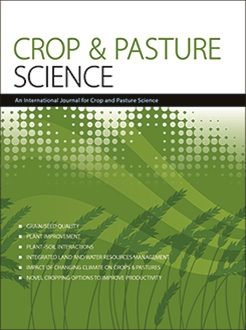Context. Organic amendments including biochar can improve crop production under salt stress. However, it is still not clear whether biochar enriched compost would enhance legume performance under salt stress after fresh application and in succeeding crops.
Aim. The aim of the study was to examine the effect of biochar enriched compost in reducing the salinity stress after fresh application at increasing rates and in the succeeding crop.
Methods. In a pot trial, biochar–compost was applied at four different rates (0, 1, 2, and 3%) while mungbean was grown under five different salt stress conditions (0, 2, 4, 8, and 12 dS m−1). In the field trial, the residual effect of different organic amendments (control, compost, cow urine, compost with cow urine, biochar–compost, and biochar–compost with cow urine) was evaluated under three different salt stress conditions (0, 3, and 6 dS m−1). Soil properties, plant performance, and nutrient uptake were determined.
Key Results. Results revealed a significant biochar × salt treatment interaction in our pot culture. Biochar–compost application can minimise salt effects at a higher application rate resulting in better plant performance; however, these effects are minimal when salt was added at higher rates. We also observed a significant residual effect of biochar compost on biomass production (51.03%), seed yield (79.48%), and K+ uptake (77.95%) than the control treatment. We believe that biochar–compost buffered Na+ while improved plant water, and nutrient availability and uptake. In addition, biochar–compost might have increased nitrogen acquisition through enhanced biological nitrogen fixation.
Conclusions. Biochar enriched compost enhances the yield of legume grown under salt stress.
Implications. Our results suggest that biochar–compost can be one of the sustainable means for alleviating soil salinity.






